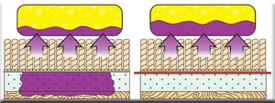Dec 3 2008
DuPont has introduced DuPont™ Active Layer RS renewably sourced moisture barrier films for use in carpet cushioning. Active Layer RS films contain a minimum of 20 percent renewably sourced content by weight, derived from naturally occurring fatty acids, and replaces existing moisture barrier films that are entirely petroleum-based.
 DuPont™ Active Layer RS moisture barrier (right) prevents spills from soaking through carpet cushioning.
DuPont™ Active Layer RS moisture barrier (right) prevents spills from soaking through carpet cushioning.
The product’s initial application is in carpet cushioning from Carpenter Company, one of the largest producers of carpet cushioning in the U.S. As a key element of Carpenter’s EnviroStep™ carpet cushioning technology, DuPont™ Active Layer RS moisture barrier film is laminated to the top surface of the cushion to prevent spills or liquids from soaking in.
This makes it possible to pull spills back to the surface – eliminating damage to the sub-floor, preventing recurring stains and preventing the cushion from harboring permanent odors. “High performance is critical to the successful adoption of bio-based products,” said Keith Smith, vice president and general manager – DuPont Engineering Polymers.
“DuPont’s market-driven science is paying off with new offerings such as DuPont™ Active Layer RS that provide comparable or better performance than the petrochemical-based materials they replace.” “We are pleased indeed to have the valuable support of DuPont in our shift to films made with DuPont renewably sourced materials,” said Ken Thompsen, vice president – sales and marketing at Carpenter Company.